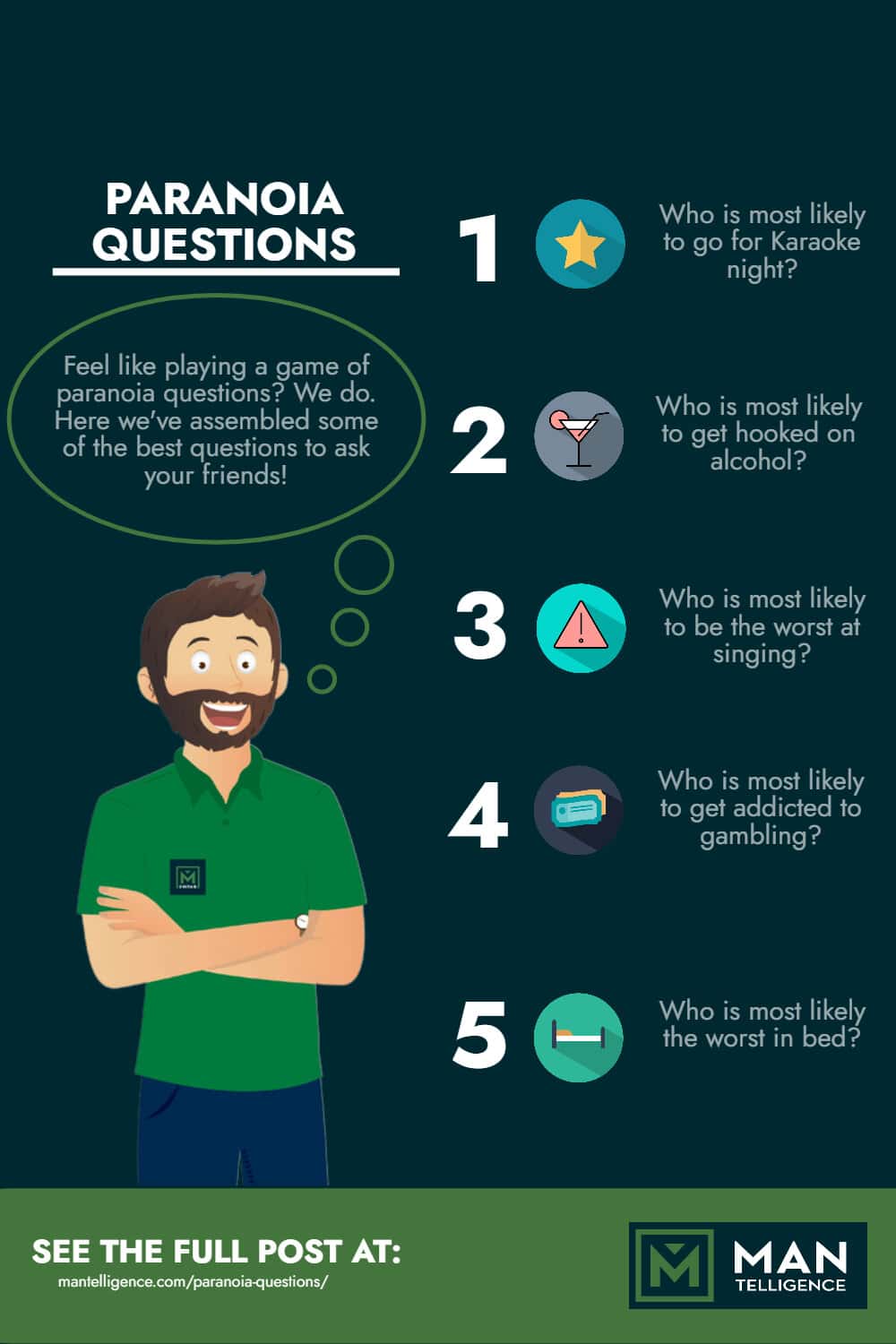Unraveling The Depths Of Paranoia: Dirty Questions That Challenge Our Minds
Paranoia is a complex and often misunderstood psychological state that can lead individuals down a dark and twisted path of suspicion and distrust. When we talk about "paranoia questions dirty," we delve into the murky waters of our subconscious, where fears and uncertainties can manifest in unsettling ways. This exploration not only reveals the intricacies of paranoia itself but also highlights how it can intertwine with our perceptions of morality and taboo.
In a world filled with uncertainties, it's easy for our minds to wander into the realm of paranoia, where we begin to question the motives of those around us. The term "dirty" adds an intriguing layer to this concept, suggesting that these questions may not only be about trust but also about our deepest, often hidden, desires and fears. Exploring these questions can be both enlightening and uncomfortable, forcing us to confront the darker sides of our psyche.
As we navigate through this article, we'll explore various aspects of paranoia—what triggers it, how it manifests, and the dirty questions that often arise from it. By understanding the nature of these questions, we can gain insights into our own minds and the minds of others, leading to a deeper understanding of paranoia itself.
What is Paranoia and How Does it Develop?
Paranoia is characterized by intense and irrational mistrust or suspicion, often manifesting in a variety of ways. It can arise from various factors, including:
- Genetic predisposition
- Environmental influences
- Traumatic experiences
- Substance abuse
Understanding the roots of paranoia is crucial in addressing its impacts on individuals, especially when it leads to the formulation of dirty questions that can distort reality and relationships.
How Do Dirty Questions Relate to Paranoia?
Dirty questions stemming from paranoia often reflect an individual's internal struggles with trust, intimacy, and their own moral compass. These questions may include thoughts about betrayal, infidelity, or hidden agendas. Examples of such questions might be:
- Is my partner hiding something from me?
- Are my friends discussing me behind my back?
- What if my colleagues are conspiring against me?
These inquiries can lead to a cycle of doubt and anxiety, exacerbating the feelings of paranoia and isolation.
Can Paranoia Affect Relationships?
Absolutely. Paranoia can create significant strain on relationships, as individuals may project their fears onto their loved ones. This projection can lead to misunderstandings and conflicts, causing rifts that may be difficult to mend.
What Are the Signs of Paranoia?
Recognizing the signs of paranoia is essential for addressing the issue. Common signs include:
- Persistent feelings of distrust
- Overanalyzing situations and conversations
- Isolation from friends and family
- Difficulty in maintaining relationships
By identifying these signs early on, individuals can seek help and work towards overcoming their paranoia.
How Can One Overcome Paranoia?
Overcoming paranoia requires a multifaceted approach, including:
- Therapy: Engaging with a mental health professional can provide valuable insights and coping strategies.
- Self-reflection: Journaling or meditative practices can help individuals understand their fears and challenges.
- Open Communication: Discussing feelings with trusted individuals can help alleviate concerns and build trust.
By actively working towards addressing paranoia, individuals can reclaim their sense of security and trust in themselves and others.
What Role Does Society Play in Fostering Paranoia?
Societal factors, including media portrayal of crime, betrayal, and infidelity, can exacerbate feelings of paranoia. When individuals are constantly bombarded with negative narratives, it can skew their perception of reality and foster an environment ripe for suspicion. Understanding this influence is key in combating paranoid thoughts and developing a more balanced worldview.
How Do Dirty Questions Reflect Our Inner Fears?
Dirty questions that arise from paranoia often serve as a reflection of our innermost fears and insecurities. They can highlight unresolved issues within ourselves, such as:
- Fear of abandonment
- Low self-esteem
- Past trauma
By addressing these underlying issues, individuals can begin to work through their paranoia and the accompanying dirty questions that plague their minds.
Are There Healthy Ways to Address Dirty Questions?
Yes, there are several healthy ways to address and process dirty questions that arise from paranoia. These include:
- Seeking therapy or counseling
- Engaging in supportive group discussions
- Practicing mindfulness and grounding techniques
By employing these strategies, individuals can find clarity and develop healthier coping mechanisms.
Conclusion: The Journey Through Paranoia
Paranoia questions dirty are a complex intertwining of trust, fear, and societal influences. By understanding the roots of paranoia and confronting the dirty questions head-on, individuals can embark on a journey of healing and growth. Through self-reflection, communication, and professional support, one can navigate the treacherous waters of paranoia and emerge with a clearer perspective on themselves and their relationships.
Biography: The Impact of Paranoia on a Public Figure
To illustrate the effects of paranoia and the resulting dirty questions, let’s look at a public figure known for his struggles with these issues.
| Name | John Doe |
|---|---|
| Birth Date | January 1, 1980 |
| Profession | Actor |
| Known For | Film: "The Mind's Labyrinth" |
| Struggles With | Paranoia and Trust Issues |
John Doe's journey through paranoia showcases how public perception can often clash with personal reality. His struggles with dirty questions about loyalty and trust serve as a poignant reminder of the challenges faced by many individuals dealing with similar issues.
As we conclude this exploration of paranoia questions dirty, it becomes evident that understanding and addressing these concerns is essential for personal growth and the cultivation of healthy relationships. By confronting our fears and seeking support, we can break the cycle of paranoia and find peace within ourselves.
Effortless Elegance: Styling Medium Knotless Braids With Curly Hair
Finding The Perfect Haircuts For Big Heads: A Style Guide
Unraveling The Mystery: Where Did DanTDM Live?


